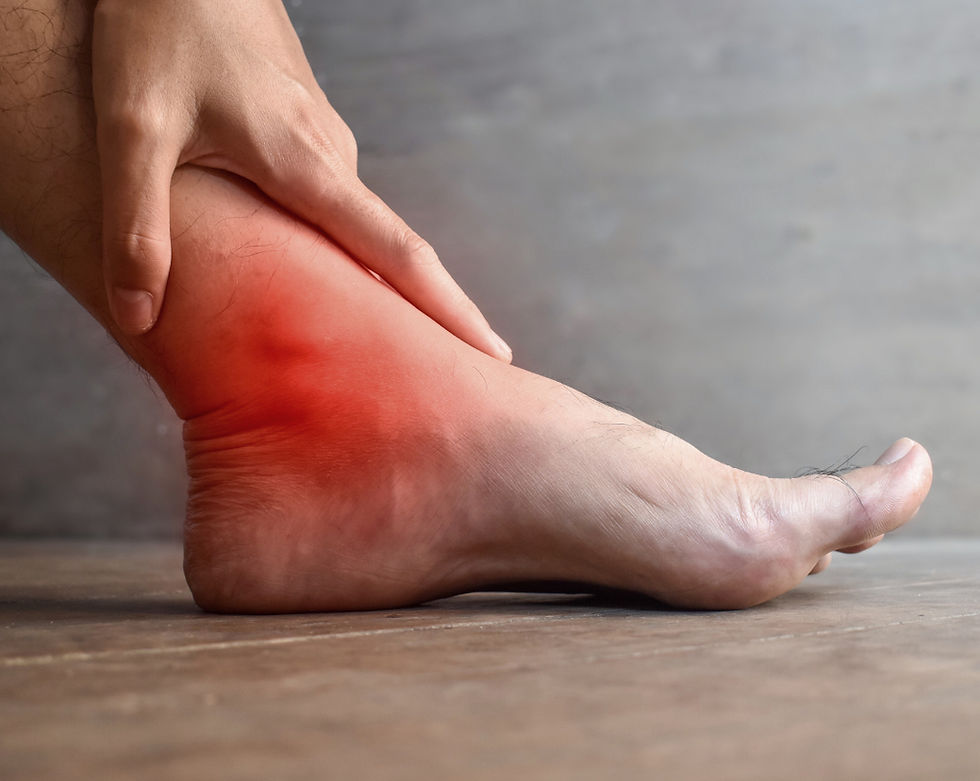Gout and Thanksgiving: How to Prevent Flares and Enjoy Your Holiday
- Dr. Isabelle Amigues

- Nov 24, 2025
- 3 min read
Updated: Feb 13
With Thanksgiving around the corner, it’s the perfect time to talk about gout—a type of inflammatory arthritis that can be triggered by the rich, protein‑heavy foods and alcohol many of us enjoy during the holidays.
Understanding how to prevent flare‑ups, manage them if they occur, and support loved ones at the table is key to enjoying a pain‑free celebration.
Gout occurs when uric acid in the body forms sharp crystals inside a joint, causing sudden, intense inflammation. The first joint often affected is the base of the big toe (the first metatarsophalangeal joint). During a flare, even the light touch of a bedsheet can be unbearable.
If someone at the table is limping, wincing, or avoiding certain foods, it might be gout. You can gently ask:
Does the pain affect your big toe or foot?
Have you recently started medications like diuretics (often prescribed for high blood pressure or fluid retention)?
These questions can help identify a possible flare and encourage them to seek proper care.
Common Myths About Gout
One of the most persistent myths is that gout is caused by overindulgence or “gluttony.” This is simply not true.
Gout is strongly influenced by:
Genetics
Certain medications (like diuretics)
Kidney function and other health conditions
Two people can eat the same meal; only one may develop gout.
The good news: modern treatments are very effective. If someone has two or more flares per year, it’s time to think beyond “treating each attack” and move toward a long‑term prevention plan.
Preventing Flares During the Holidays
You can still enjoy Thanksgiving. The goal is preparation, not perfection.
1. Medication Prep
If you already take colchicine, your rheumatologist may recommend a slightly higher dose around high‑risk meals (for example, taking two tablets instead of one—always confirm with your doctor).
Anti‑inflammatories such as naproxen or ibuprofen can sometimes be used preventively, again under medical guidance.
2. Hydration Is Key
Drink plenty of water throughout the day.
A simple rule: one glass of water for every glass of alcohol.
This helps your kidneys clear uric acid more effectively.
3. Don’t Over‑Restrict Yourself
You don’t have to avoid all protein. Protein is essential for muscle and overall health, especially as we age.
The goal is not to make you afraid of food—it’s to prevent flares while you live your life.
4. Plan Ahead
Know your usual triggers and take steps before the meal starts. Preventing a flare is always easier than trying to calm one once it’s in full swing.
When a Flare Happens
A flare often occurs when uric acid crystals shift inside the joint, triggering a wave of inflammation.
Colchicine and anti‑inflammatories help block that inflammatory response.
Avoid starting or increasing uric‑acid–lowering medications (like allopurinol) in the middle of a flare unless your rheumatologist specifically directs you to; changes at the wrong time can temporarily make symptoms worse.
Long‑Term Gout Management
The long‑term goal is to keep uric acid at a safer level—often below 5–6 mg/dL, depending on the person. When uric acid is consistently controlled:
Flares become less frequent and less intense
Joint damage can be prevented
Most people can return to a normal, largely unrestricted lifestyle
This usually involves:
A uric‑acid–lowering medication plan
Hydration and monitoring
Periodic lab checks and follow‑up with a rheumatologist
Supporting Loved Ones with Gout
If someone you care about has gout, it helps to remember:
A gout flare is red, hot, swollen, and extremely painful—it’s not “just sore.”
Flares are triggered by movement of uric acid crystals and inflammation, not simply one “bad” meal.
Prevention with medication, hydration, and planning works far better than relying on strict food restriction alone.
Offering understanding—and maybe a chair with their foot elevated—goes a long way.
Modern gout management is about living fully, not living in fear.
With the right preparation, medications, and support, you can enjoy your Thanksgiving meal without letting gout control the day. Empower yourself with knowledge, support those around you, and remember: gout is highly treatable, and remission is possible.
Are you in need of a compassionate rheumatologist who will listen and work with you toward disease remission? If you're searching for the best direct-care rheumatologist in Denver, UnabridgedMD is here for you. Click here to get in touch https://www.unabridgedmd.com or call 303-731-4006
or call 303-731-4006
#GoutAwareness #GoutRelief #GoutFlare #GoutTreatment #GoutDiet #InflammatoryArthritis #ArthritisRelief #JointPain #ChronicJointPain #Rheumatology #GoutPrevention #UricAcid #LowerUricAcid #Colchicine #AntiInflammatory #HealthyHolidays #ThanksgivingTips #HolidayHealth #HolidayEating #ArthritisEducation #JointHealth #PainFreeLiving #LiveWithGout #GoutSupport #ProteinAndGout #HydrationTips #WellnessTips #ChronicIllnessSupport #AutoimmuneWellness




Comments